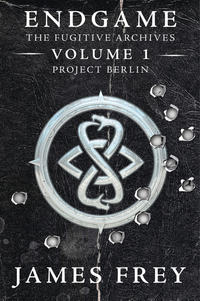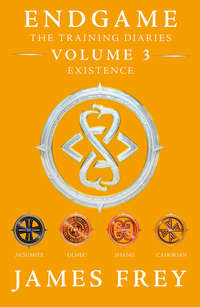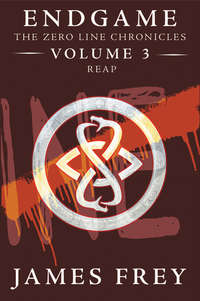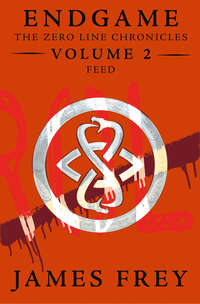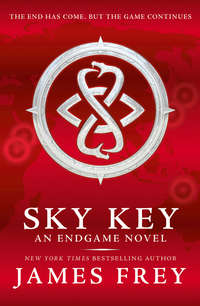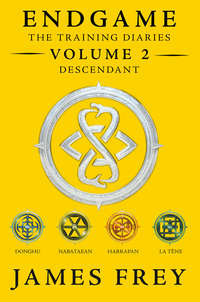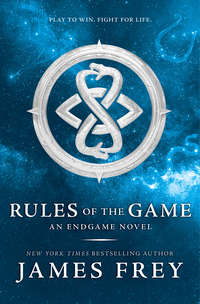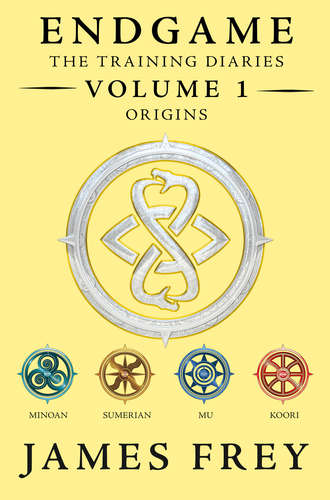
Полная версия
Origins
It’s strange now, thinking about his life back then. It doesn’t feel real, or at least it doesn’t feel like his life. He was a different person then, before he knew the truth about the world and his place in it. His life, the one that matters, is defined by Endgame, and by his friendship with Xander. Before them, he was just a fraction of himself. Now he’s whole.
Elias Cassadine, the camp leader, takes the podium to deliver a speech about the import of this decision and the honor he is about to bestow. Marcus has endured many a lecture by Elias, and knows the man will drone on forever about the long-lost Minoan civilization and its tradition of heroes. How the legendary King Minos was actually an alien god, who chose the Minoans, of all peoples, to live among and rule. Elias will speak of Endgame as a sacred compact between the Minoans and the beings from the stars, a chance for this chosen people to rise above the rest—if their champion can rise to the challenge. He will boast about the camp’s rigorous training program and the care with which the instructors have selected their Player. As if it takes some kind of genius to pick out the best. Elias will talk duty and sacrifice, and how everyone in the audience owes a debt of gratitude to their new Player. He’ll blather on forever while everyone fidgets in their seat and pretends not to be bored out of their skulls.
Xander catches his eye and Marcus mimes choking himself. Put me out of my misery, he means, and of course Xander knows it, because Xander always knows what he means. For the last five years, everything he’s done, he’s done with Xander. It’s going to be strange, going forward alone. Yes, he can do it on his own, but why would he want to?
Marcus wonders whether he might be able to talk Elias into defying tradition and letting him keep Xander around. Batman had Robin, Theseus had Daedalus—why couldn’t Marcus have Xander?
It’s a brilliant idea, and he can’t believe he didn’t think of it before. He’s working up some good arguments in favor of it when he realizes that Elias Cassadine has stopped droning and excited murmurs are rippling across the crowd. Beside him, Xander has gone pale.
“Meet our new Player,” Elias says, and Marcus is already rising to his feet when his brain kicks in and processes what he’s just heard. What he’s hearing now, as Elias says it one more time, almost drowned out by the thunder of the cheering Minoans.
Xander’s name.
Xander’s name, not Marcus’s.
This isn’t happening, Marcus thinks, because it can’t be happening.
This is just a dream, Marcus thinks, because he’s had many like it—nightmares, really, but then he always wakes up.
There is no waking up this time.
This is real. The announcement has been made. The choice has been made, and it’s Xander who steps hesitantly up to the podium, lowers his head as Elias sets the golden horns atop his wild curls. A tribute to the legend of the Minotaur, these horns are the official marker of the chosen Player, and it’s Xander who will bear them. Xander who clasps his hands over his head in triumph, Xander who’s been named the best. Xander who’s been named the Player.
It’s Xander who’s won.
It’s Marcus who’s been left behind.
Things move quickly after that. They are all expected to leave the camp by the end of the week. Soon a new group of children will arrive to begin seven years of training and claim the camp as their own. Marcus and the others will go back to their families, while Xander goes forward. Somewhere.
“You really can’t tell me where?” Marcus says. They’re packing up the room they share. Seven years of memories dumped into a few cardboard boxes, taped up, and sent away. Of all these belongings, the only one that means anything to Marcus is the golden ax—and even that has lost its shine. The labrys was supposed to mean something, was supposed to mean he was chosen. Now? It’s nothing but a rusty old ax. Marcus thinks that he should offer it to Xander as a gift, a way of saying without saying, The future belongs to you.
Instead he tosses it in a box, and resolves to throw it away as soon as he gets the chance.
“I really can’t tell you.” Xander pulls out a pizza box that must have been sitting under his bed for weeks. That would explain the smell. “They swore me to secrecy about all Player stuff, and I don’t think they’re kidding around.”
Don’t be jealous, Marcus reminds himself, like this is even possible. Like he’s not seething with rage.
“No worries,” Marcus says. “Feel free to lord it over me with your super-special Player secrets and your exotic classified missions. I’ve got secrets too, you know. You’ll never guess what I’ve got hidden in this sock drawer.”
“A pack of condoms you ordered online and have been hoarding for so long they’ve probably turned to dust,” Xander says, without missing a beat. “Plus some incredibly foul socks.”
He’s right on both counts. It only makes Marcus angrier.
How dare Xander keep secrets?
How dare he act like everything is the same between them, like they’re still best friends, like everything is fine—when everything is ruined?
How dare he win?
There’s an awkwardness between them now, a stiff silence, and Marcus knows it’s his fault.
“I really thought it would be you,” Xander says, not for the first time. It makes Marcus want to punch him, because how’s he supposed to respond? “So did I”?
Actually, that’s not a bad idea. So he says it out loud. Then laughs, like it was a joke.
Xander laughs too. Fakely. It’s even worse than the silence.
Marcus knows he’s acting like a spoiled brat. Like a child who doesn’t get what he wants and throws a temper tantrum. But it’s not like Xander’s any better, with this humble aw, shucks act, like he’s not loving every minute of this. Maybe it would be different if Xander would just own it, rub his victory in Marcus’s face.
That’s always been the way between them—always crowing, always bragging, never apologizing.
They could afford to be honest, because they were on such even ground.
Not now.
Now every word out of Xander’s mouth sounds like an apology, and Marcus sees that for what it is: pity.
“We’ll still be friends,” Xander says, tossing a sweatshirt in his suitcase. It’s Marcus’s sweatshirt, but Marcus doesn’t say anything. Xander’s already taken everything that matters. What’s one sweatshirt more?
“Yeah, sure,” Marcus says, not even bothering to sound like he means it. “Of course.” Because what’s Xander going to do, come home from swimming the English Channel or battling a fleet of ninjas—then go play video games in Marcus’s basement? Not going to happen.
“Anyway, I’ve got kind of a surprise for you,” Xander says.
Marcus grunts. He’s tired of surprises.
“They gave me three days before I have to leave,” Xander says.
“For your magical mystery tour.”
“Yeah. That. Three days . . . and access to a helicopter.”
Marcus freezes. Despite his foul mood, he feels his lips drawing back in a smile. He can’t stop himself.
Because he knows what a helicopter means.
“So?” Xander says, hope lighting up his face. “You in?”
With a helicopter at their disposal, they can fly from the nearby Daskalogiannis airport to Nea Kameni, a remote, uninhabited island where an active volcano pokes out of the Aegean and into the clouds. They can, as they have done before, hike up to the lip of the volcano and then rappel down into the maw of the beast, feel the heat of the lava on their backs, test themselves against the most powerful foe nature has to offer. Thirty-five hundred years ago, a volcanic eruption on the island of Thera destroyed the Minoan settlement at Akrotiri and devastated communities all along the coast of Crete. The eruption spelled the beginning of the end of Minoan civilization—now, every time Marcus bests a volcano, he feels he’s striking a blow on behalf of his ancestors. It’s rare they can find a way to get themselves to Nea Kameni—rarer still that Xander agrees to try. He may have overcome his childish fear of heights, but he’s never much liked the idea of climbing into a massive cauldron of boiling lava. Marcus usually has to butter him up for days, whine and plead and promise to do his homework, before Xander finally gives in.
Not this time, obviously.
Xander knows what he’s doing, dangling this trip before Marcus. A volcano climb is the one thing he can’t resist.
“No way will they let you,” Marcus says, trying hard to maintain his sulk. It’s tough: Even thinking about the climb has him jittery with excitement. “You think they’re going to let their precious Player risk himself on a stupid volcano?”
“Leave that to me,” Xander says. “If I can’t handle a few overprotective instructors, how am I supposed to save the world?”
Good question, Marcus thinks.
Then he thinks:
Enough.
Yes, a mistake has been made. Yes, Marcus deserved this win. Yes, he is in despair, and his life is pretty much over. But that’s not Xander’s fault. And if their positions were reversed, Xander would find a way to accept it. He would find a way to be happy for Marcus, because that’s the kind of person he is.
Marcus resolves to be that kind of person too.
He resolves to be happy for Xander.
Or at least do a better job of faking it.
It is easy, at the base of the volcano, to imagine they are the last two people on Earth. That Endgame has come and gone, the human species wiped off the face of the planet, the two of them abandoned to live out their days on this bare rock. It wouldn’t be so bad, Marcus thinks. Blue sky and turquoise sea, days in the sand and nights by the campfire, nothing to do but race each other up and down the volcano, no one to say who won and who lost, who is special and who is not—no obligations to their people or to the future. Only the present moment, only the two of them.
The first night, sitting around the campfire, toasting marshmallows and doing their best impressions of Elias Cassadine, it’s hard to remember that this won’t last forever.
They’ve brought tents, of course, but both of them prefer sleeping under the stars. They lie on their backs, side by side, the silence between them comfortable instead of awkward. Like it used to be, before.
“What if I can’t hack it?” Xander says quietly.
“It’s only a couple thousand meters,” Marcus says. “You can do that in your sleep. And if you can’t, I’ll just toss you over my shoulder and carry you up. Not like I haven’t done it before.”
“That’s not what I mean,” Xander says.
Marcus knew that.
He doesn’t want to talk about it—not now, in this place where it’s so easy to forget. Once they leave here, Marcus will begin the rest of his life. His loser’s life. He’ll never be able to forget again. This is supposed to be their escape from all of that. And Xander is about to ruin it.
“What if it actually happens? Endgame. And it’s all on me.” Xander speaks slowly, like he knows this isn’t anything he should admit out loud. “How do they know I’ll be good enough? What if they’re wrong?”
“They’re not wrong,” Marcus says, glad Xander can’t see his face in the dark. “They know what they’re doing. They’ve been doing this for centuries, right? If they picked you, then it’s supposed to be you.”
“You sound so sure,” Xander says. “Everyone is so sure—except for me. Doesn’t that mean something? That I’m not sure?”
“Not everything has to mean something,” Marcus says. “You take things too seriously.”
“We’re talking about the end of the world,” Xander says, frustration leaking through. “I’m not supposed to take that seriously?”
Marcus says nothing.
“You wouldn’t have any doubts,” Xander says—and, incredibly, he sounds jealous. As if Xander has reason for envy. “You’d know you could do it. You’re probably thinking right now that you could do a better job than me. Admit it.”
“Maybe I am,” Marcus says, because Xander is his best friend. And because it’s easier to be honest in the dark. “But maybe being sure isn’t always the important thing. Maybe having doubts will make you stronger.”
“How?” Xander’s voice is small, almost afraid. Eager for Marcus to tell him what to do. And for that one moment, Marcus truly wishes he had the answer—knew the words that would calm Xander’s fears and help him believe in himself.
But he doesn’t.
“I don’t know,” Marcus admits.
“Exactly.”
The morning is crisp and clear, perfect for a climb.
Neither of them is in the mood to talk.
They pack up their ropes and carabiners, then begin the long haul to the summit. The volcano looms above them, hissing smoke and ash into blue sky. It’s like climbing any mountain, but it feels different when you know what’s waiting for you at the top. When, at any moment, the cavernous mouth could spit out a glob of lava that would incinerate you in seconds.
Marcus focuses on that feeling of approaching danger. He focuses on finding handholds and footholds, on pulling himself up one arm-length at a time. On the crumbling rock beneath his fingers and the heat of the sun on his back. On the loamy smell of the rock and the twitter of distant birds. On his body, pushed to its limits; on this lonely wilderness at the edge of the world. Tunnel vision: it’s another reason he’s so good at climbing. To summit the great peaks, you have to shut everything else out. You have to believe nothing matters but making it to the top.
He and Xander do not race, not this time. Competition seems beside the point for them now. They climb at a steady pace, Marcus leading the way. Until, impatient to reach the summit, Marcus pushes himself to climb faster.
“Thought we weren’t racing,” Xander pants from behind him, which only makes Marcus speed up more.
He tells himself it’s only about getting to the top. That it has nothing to do with wanting to exhaust Xander, to prove to both of them that Marcus is still the best.
But behind him, Xander breathes hard, gasping with effort, while Marcus smiles and picks up the pace.
It takes them half the day to reach the summit.
Now the fun can begin.
It’s like a different planet up here—a dead, arid one choked by sulfuric gases and thick clouds of ash. The gaping vent in the rock spews clumps of lava and burps puffs of oppressively hot air. They’re braving this climb without masks, and the foul gases—toxic enough to eat through metal—burn Marcus’s eyes and scald his throat. Small fissures in the rock called fumaroles exhale clouds of steam, and gossamer threads of cooled lava weave eerie orange spiderwebs in the rising updraft. From Marcus’s perch on the rim, the lake of lava several hundred meters below is almost completely obscured by thick ash and smoke, but the red glow is unmistakable, like a second sun. The noise is thunderous, earsplitting, an engine roar that drowns out everything else. This is an alien place; humans are not meant to survive here.
Marcus loves every inch of it.
“Remind me again why I let you talk me into this?” Xander shouts over the noise as they hoist themselves over the lip of the volcano. It’s what he says every time. And every time, Marcus responds with Because you can’t say no to me.
But that’s no longer true, of course. Xander is the Player: he can say no to anyone and anything he wants. It’s Marcus who’s obligated to serve Xander’s whims.
So instead he says, “You don’t want to come, just wait here.” Then propels himself over the lip of the volcano without waiting to see whether Xander will follow.
It’s like traveling back in time, into an age of tectonic creation and primordial ooze.
It’s like descending into the mouth of hell.
Hot air closes in with a pressure that makes his ears pop. Every breath is scalding poison. The walls are rainbowed with color, chemicals glazing the rock—orange iron, green manganese, white chlorine, cheerfully yellow sulfur. The sky above disappears behind a thick cloud, and there is only the cavernous volcano, and the sea of magma below.
Marcus stares into the frothing, sparking abyss. It’s easy to imagine he’s staring into the molten center of the earth.
Legend says it was a volcano that erased the ancient Minoan civilization from the face of the earth, and Marcus can believe it. His people spend so much time worrying about destruction coming from the stars—but if they knew what it was like down here, they would fear the earth just as much, its destructive power immense enough to consume itself.
That’s how Marcus feels now, too: bent on destruction. Consuming himself.
He swings himself down the cable and howls into the steaming pit. All his envy and despair, his rage and frustration, his disappointment in himself and his terror of what’s to come, he flings it out of himself and into the churning magma below.
It feels good.
Good enough that he looks up to the lip of the opening, where Xander still perches hesitantly on the edge, and shouts, “What are you waiting for, slowpoke?”
Xander waves, then leaps off the edge, hurtling into the air. The cable stretches taut and he swings back toward the inner wall of the volcano—and that’s when it happens.
Without warning. Without reason.
The line snaps.
“Xander!” Marcus screams. There’s nothing he can do but watch.
Watch his best friend plummet down and down.
Watch the broken cable dangle uselessly, too many meters overhead.
Watch Xander fling out his arms, reach blindly and desperately for purchase, for something that will slow his fall.
Watch, and hope.
Xander does it. The impossible. Catches his fingertips on a jutting rock, halts his descent. He can’t stop his momentum, and his body smashes into the volcano wall with such impact that Marcus can nearly hear the crunch of bone.
“Xander,” he whispers, panic stealing away his breath.
Xander is dangling by his fingertips, nothing saving him from a drop to his death but vanishing strength and sheer will. It’s crazy that things could turn so wrong so quickly. But the craziest thing of all: Xander is grinning.
“Little help up here?” he calls down to Marcus, barely audible over the volcano’s roar. There’s a lilt in his voice, and Marcus recognizes it, that adrenaline shot of pure joy that comes from facing death and surviving. “Or you going to leave me hanging?”
It’s a joke, of course. It would never occur to Xander that Marcus would just leave him there.
It wouldn’t have occurred to Marcus either.
Not until Xander put the idea in his head.
It will be easy for Marcus to save him. He need only climb up to where Xander is dangling and clip him on to the intact cable. So why would Xander look worried? He assumes Marcus will do exactly what he’s supposed to do. He assumes everything will work out.
Because for Xander, everything always works out.
Marcus works hard, Marcus tries, Marcus needs—while Xander just hangs around, waiting for good luck to drop into his lap. Expecting it.
What if this time, things go differently?
What if this time, Xander’s luck turns sour?
Marcus doesn’t climb up the cable. He doesn’t do anything. He watches.
He watches Xander’s arm muscles straining, his fingers turning white as the blood leaches out of him.
Now you know how it feels to want, Marcus thinks. How it feels to be desperate.
How do you like it?
The desperation is painted across Xander’s face. “Marcus!” he shouts, no longer kidding around. “What are you waiting for?”
There’s probably panic in his voice, but it’s hard to tell, over the noise.
Marcus still doesn’t move.
He tells himself: Just a few more seconds. Just enough to give Xander a taste of need. Just enough to scare him a little and remind him that he can’t always expect the world to fall at his feet, cater to his desires.
“What the hell are you doing, Marcus!” Xander screams. “Marcus!”
He’s losing his cool.
Marcus has always been able to make Xander lose his cool.
But what does that say? If Marcus can so easily throw Xander off his game, then how can anyone think Xander is the strong one? If Marcus can defeat him this easily, how can Xander expect to stand up to any of the other Players? How can he carry the fate of the Minoan people on his shoulders?
It’s a mistake. Even Xander admitted that much.
Letting him continue would mean risking all their lives.
I should let him fall, Marcus thinks. I’d be doing everyone a favor.
It’s just another joke, though.
It has to be.
Because surely he’s not serious about doing nothing, watching his best friend’s fingers slip from the rock, watching Xander frantically try to hang on.
Even though the thought is in his head now—and the thought makes the deed possible.
It would be that easy.
To do nothing.
To let gravity take its course.
Let Xander save himself, if he can. What could be wrong with forcing the new Player to face one simple test? To prove that he’s the right man to protect his people? Or give way to the one who can?
Marcus isn’t doing anything wrong.
He’s just not doing anything.
Xander sees it in his face—knows what Marcus is going to do before Marcus knows it himself. It’s always been this way between them.
“You’re better than this,” Xander pleads.
But it turns out he’s not.
After, in his nightmares, he sees it again and again.
Xander’s fingers slipping, giving way.
Xander falling.
The fall seems to take forever.
It takes enough time for Marcus to realize what he’s done.
To regret.
To scream Xander’s name.
To watch helplessly as Xander plunges into the lake of fire.
The churning molten rock sucks him under. Marcus doesn’t see the burning lava strip away his flesh, flood his lungs, melt his bones, turn him to ash. Not in real life, at least.
In his nightmares, he sees every detail.
“I don’t know what happened,” Marcus tells people, and this part of the lie is easy, because it’s true. “He was there—and then he wasn’t.”
He tells the same story to everyone: The ground crew that greets him when he staggers off the helicopter. Elias Cassadine, who collects him from the airfield, patting him on the shoulder in some sorry approximation of comfort. The other kids from camp, who gossip about every gruesome detail. Xander’s parents, who will not stop crying.
“His line snapped, and I tried to help him, but I couldn’t,” Marcus says, over and over again. “I couldn’t get there in time.”
And everyone—even Xander’s mother, through her tears—says, “Don’t blame yourself.”
He acts like a zombie, shuffling through one day and the next. It’s not just for show. He feels dead inside. Hollowed out. He has to force himself to go through the motions of life. Put one foot in front of the other. Remember to eat. Remember to breathe. Do not tell the truth.
Do not.
He wants to shout it to the world, the truth of what he’s done.
But maybe that’s a lie too. Because if he really wanted to, he would.
Instead he lies, and keeps lying. He misses Xander and blames himself, and every night as he falls asleep, he whispers a plea for forgiveness and swears that in the morning, he’ll turn himself in.
Then morning comes, and he lies. And every time he does, it’s like killing Xander all over again.
He is chosen to be the Player in Xander’s place.
“Think of it as a tribute to your friend,” Elias says. Marcus tries.
There is no ceremony this time around. No amphitheater filled with screaming hordes, no long speech about his impressive accomplishments and glorious future.


